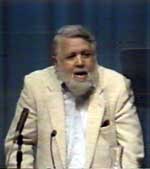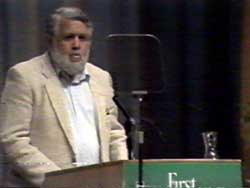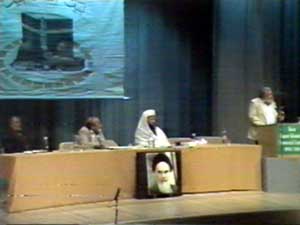| |
|
Convergence in
Muslim Political Thought: the contribution of Imam Khomeini
lecture by
Dr
Kalim Siddiqui,
presented at
the 1st Imam Khomeini Memorial Lecture, Muslim Institute, 12 May
1990.
Dr Kalim Siddiqui (1931-1996) was Director of the Muslim Institute,
London, and one of the leading thinkers of the global Islamic
movement. He also founded and led the Muslim Parliament of Great
Britain, inaugurated in 1992.
[Courtesy: Institute of Contemporary Islamic Thought]
 |
"
Once, after the hijrah to Madinah, Islam had undergone transition
to Statehood, the spread of Islam to the peninsula was rapid
and total. Islam is incomplete without the Islamic State;
there is no room for dispute on this point ." |
|
"
The point that is obscured in modern apologetic literature
of Islam and neatly sidestepped by the orientalists is that
Islam is not only a message, Islam is also a method. Some
of the islamic parties that emerged during the colonial
period also failed to grasp this essential point. They understood
Islam within the framework of european style social democracy.
For them the Islamic state was only a slightly updated islamized
version of the post colonial nation state, it only required
them to win an election and come to power. These Islamic
political parties did not realise that there was a colonial
legacy to be undone and dismantled. In their simplistic
thinking the Islamic state of their conception would be
built on the secular and nationalist foundations of the
post colonial independent state. What is undoubtedly true
is that some of these political parties had perhaps unwittingly
borrowed many of their ideas from sources outside Islam."
|

|
"
There have always existed ulema of all schools of thought
in Islam who were willing and able to eliminate the error
and bind the Ummah together. The number of the so called
ulema committed to fithna and permanent divisions in the
Ummah has always been small though vocal because they have
also enjoyed the political patronage of the ruler bent upon
transforming error into long term even permanent deviation,
this deviation began with the Bani Umaiyya and continues
today under the saudi regime."
|
| "
It is probably no exaggeration to say that Imam Khomeini corrected
the political deviation of the entire ummah that began with
the advent of umayad rule in terms of the legitimacy of the
leadership of the Islamic State Imam Khomeini restored the
situation as it existed during the rule of Ali ibn Abi Talib" |
 |

|
|
